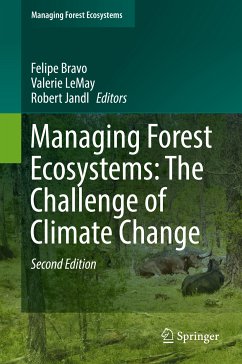During the last decades climate changes, particularly warming trends, have been recorded around the globe. Climate change shaped the political agenda during the last decade with three issues as hot topics, commonly making the headlines: carbon budgets, impact and mitigation of climate change. Changes in climate have become evident through insect epidemics, drought episodes and intense forest and unusual storm activities. Climate changes are expected to impact vegetation manifesting as changes in vegetation extents, tree species compositions, growth rates, and mortality rates, and also as species migrations. Over a number of sessions, the International Panel on Climate Change (IPCC) has discussed how forests may be impacted and also how forests and forest management practices may be used to mitigate the impacts of changes in climate, particularly to possibly reduce the rate of change. Given the significant role that forests play in the climate system - as sources, sinks, and through carbon trading - this book update the current scientific evidences on the relationships between climate, forest resources and forest management practices around the world. This new book edition, which forms part of Springer's book series Managing Forest Ecosystems, presents an update on state-of-the-art research results, visions and theories, as well as specific methods for sustainable forest management under changing climatic conditions. The book contains a wealth of information which may be useful to foresters and forest managers, politicians and the legal and policy environment and forestry administrators by presenting and analysis of the current knowledge, and a series of case studies focused on the biological and the economic impacts of climate change in forest ecosystems in Africa, Asia, Europe and North and South America.
Dieser Download kann aus rechtlichen Gründen nur mit Rechnungsadresse in A, B, BG, CY, CZ, D, DK, EW, E, FIN, F, GR, HR, H, IRL, I, LT, L, LR, M, NL, PL, P, R, S, SLO, SK ausgeliefert werden.









